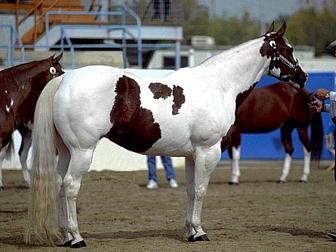
OVERVIEW
The American Paint horse is a color breed unlike the Pinto which it resembles. The primary difference between the Paint and the Pinto is the stipulation that to be registered as a Paint, the horse must be either a Quarter Horse or Thoroughbred. The Paint horse is generally found with a stock horse build, although some are used for racing.
PHYSICAL DESCRIPTION
The Paint appears in a variety of different conformations, and stands between 14 and 17 hands. What distinguishes the various Paint horses is coloring. Paints, like Pintos, are described as overo or tobiano, depending on the pattern of their coloring. Besides piebald and skewbald, there are the types "overo " and "tobiano." Overo is a type created by the recessive color gene and the solid (darker) color predominates. It is claimed that Cortes brought two overo types with him to America in the 1500s. Tobiano is a type created by the dominant color gene and the white is the more predominant color with markings of colors other than white.
ORIGIN
The term "paint" is the English translation of the Spanish work Pintado. Paint horses are descended from spotted Quarter horses and Thoroughbreds.
INTERESTING FACTS
The creation of the American Paint Horse Association was due in part to the fact that horses of Paint coloring were discriminated against by other associations. For instance, the American Quarter Horse Association will not register a spotted horse regardless of its breeding, however excellent or pure. Many owners of spotted horses feel their horses receive poor marks from show judges due to color. In fact, in some shows judges have been known to refuse the entries of spotted horses. Therefore, there are now a considerable number of shows restricted to spotted horses. Ironically, in the old west, cowhands would pay considerably more for a spotted horse than a horse of conventional coloring.
INFLUENCES
1. Spanish
For more information:
American Paint Horse Association